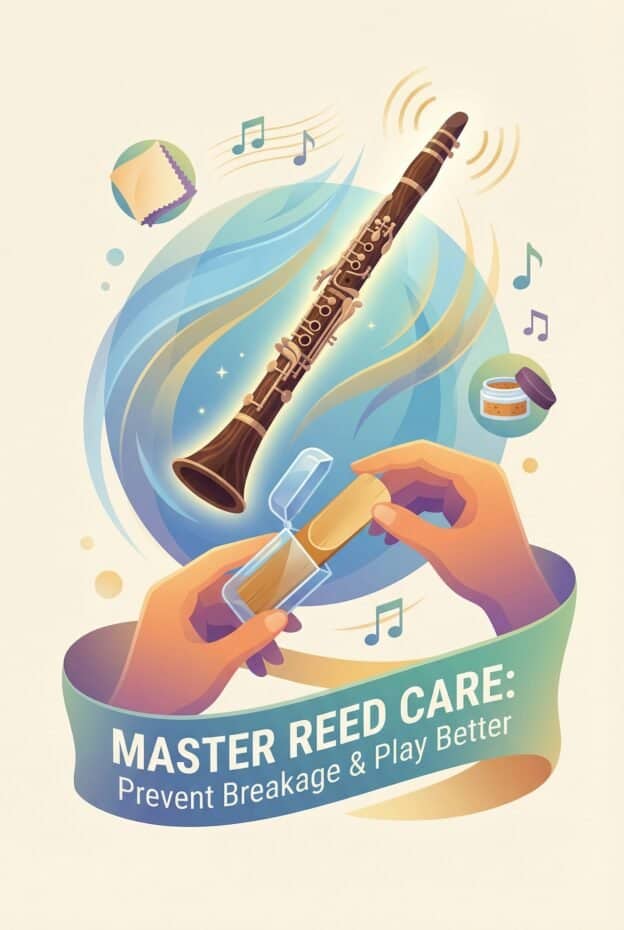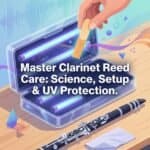To prevent clarinet reed breakage: handle reeds by the spine, seat them properly, rotate and store them flat in a ventilated case with a humidifier, wet before play, avoid extreme temperature changes, inspect daily for hairline cracks, and replace reeds at the first sign of significant wear.
Why Clarinet Reeds Break: Common Causes and Failure Modes
Clarinet reed breakage almost always comes from a mix of mechanical stress and moisture changes. Cane is a natural, fibrous material. When it dries, swells, or flexes too far, microscopic fibers fail. Over time, those tiny failures join into visible chips, cracks, or complete breaks, often right when you need the reed most.
Most clarinetists see three main failure modes: tip chipping, longitudinal cracking along the grain, and splitting at the heel. Tip chips usually come from impact, such as bumping the mouthpiece on a stand or teeth contacting the tip. Long cracks often follow repeated flexing on a dry or over-strength reed. Heel splits tend to result from rough handling or overtightened ligatures.
Environmental stress is just as important as physical impact. Moving quickly from a cold car into a hot rehearsal room can shock the cane. Rapid moisture swings from dry storage to immediate hard playing also create internal tension. Over time, this cycle weakens the reed, especially near the tip and heart where the cane is thinnest yet under the greatest vibration.
Player setup and technique also affect breakage. A reed that is too hard for the mouthpiece and embouchure requires more pressure and air, which flexes the tip beyond its elastic limit. A misaligned reed or ligature that clamps unevenly can twist the reed, concentrating stress along one edge. Poorly finished mouthpiece rails or a chipped tip rail can nick the reed and start a crack.
Age and wear matter as well. As a reed is played, the tip thins, the fibers soften, and the surface erodes. This can sound good for a while, but the structural margin shrinks. Reeds that look gray, heavily grooved, or frayed at the tip are far more likely to break suddenly, especially under forte dynamics or aggressive articulation.
Understanding these causes lets you act early. If you control moisture changes, avoid impacts, match reed strength to your setup, and retire reeds before they are dangerously worn, you can cut unexpected breakage dramatically and keep your sound consistent from rehearsal to performance.
Clarinet Reed Anatomy and How It Affects Durability
Clarinet reed anatomy explains why some areas break more easily than others. A standard reed has the tip, vamp, heart, rails, spine, and heel. Each region has a specific thickness and role in vibration. The thinner the cane, the more it vibrates and the more fragile it becomes under stress or dryness.
The tip is the thinnest part, often around 0.10 to 0.14 millimeters on many commercial reeds. This area starts and controls vibration, so it flexes thousands of times per second. Because it is so thin, any small chip or crack here quickly affects response and can propagate into a full break if the reed is pushed hard.
The vamp is the tapered area from the tip toward the thicker heart. It balances flexibility and stability. If the vamp is cut too thin or unevenly, it can warp or crack along the grain. The heart is the thicker central region that provides strength and core tone. A reed with a strong, well-centered heart usually resists catastrophic breakage better than one with an off-center or very thin heart.
The spine runs down the center of the reed from the heel toward the tip. It is slightly thicker than the surrounding cane and acts like a beam that carries load. Handling the reed by the spine and heel protects the delicate tip and rails. The rails are the thin edges along each side of the vamp. They seal with the mouthpiece rails and are prone to chipping if they hit a hard surface.
Inside the cane, the microstructure matters. Arundo donax cane has vascular bundles that run along the length of the reed. These bundles are like tiny tubes and fibers that give strength along the grain but can split if stressed too much. Research from musical acoustics labs in France and Germany has shown that fiber orientation and density strongly affect both tone and durability.
Tip thickness, cut style, and strength rating all change breakage risk. A very thin tip on a soft reed (for example, 2 or 2.5 strength) feels easy to play but can chip if mishandled. A very hard reed (3.5 or 4) has more material but often faces higher embouchure pressure, which can cause longitudinal cracks if the reed is dry or not fully broken in.
Visualizing a cross section helps. Imagine slicing the reed across the vamp: you would see a curved outer surface, a denser outer layer, and a more porous inner core. The outer layer resists wear, while the inner core absorbs moisture. Uneven moisture between these layers causes warping, which increases stress on the tip and rails and raises breakage risk.
Historical context of cane reeds and durability
Single reeds made from cane have been used on clarinet-type instruments since the 18th century. As clarinets evolved in Paris, Vienna, and later the United States, makers refined reed shapes and cuts to balance tone and strength. By the late 19th century, commercial cane reeds became widely available through music shops and catalogues.
Martin Freres, known primarily for clarinets, also participated in the growing trade of accessories in the early 20th century. Surviving catalogues from around 1910 to 1930 list cane reeds in graded strengths, marketed to band and conservatory players who wanted predictable response and durability. Museum and archive listings of Martin Freres sets often include original reed boxes, showing how important reliable reeds were even then.
Best Practices for Handling and Seating Your Reed
How you handle and seat a clarinet reed is one of the fastest ways to reduce breakage. The goal is simple: never stress the tip, never twist the reed against the table, and always use the ligature to secure the reed without crushing it. Small habits here pay off in many extra playing hours per reed.
Start by handling the reed only by the heel and spine. Avoid touching the tip or vamp with fingers, as skin oils soften the cane and increase the chance of accidental bending. When removing a reed from its sleeve or case, slide it out gently and keep the tip clear of hard edges, including the case lid and mouthpiece cap.
When seating the reed, place the flat side on the mouthpiece table first, then slide it up until the tip of the reed aligns with or slightly below the tip of the mouthpiece. Do not press the tip with your thumb. Instead, hold the reed lightly by the sides near the heel while adjusting its position. The tip should never be used as a handle.
Next, place the ligature over the reed and mouthpiece without dragging it across the tip. If your ligature loads from the top, lift it high enough to clear the tip before sliding it down. If it loads from the bottom, keep the ligature loose and guide it gently into place. Tighten screws just enough to prevent movement, not so tight that the reed is compressed.
Check alignment from the front and sides. The reed should be centered left to right, with equal rail showing on both sides. Misalignment can cause uneven stress and increase the chance of chips on the exposed side. A reed that is too high or too low on the table can also flex incorrectly, especially during loud playing or wide dynamic changes.
Removing the reed demands the same care. Loosen the ligature fully before sliding it off, then support the reed with a finger on the spine near the heart as you lift it away from the mouthpiece. Avoid pulling it sideways or twisting it, which can start small cracks at the heel or along the grain.
Moisture, Humidity, and Temperature: Controlling the Environment
Moisture and temperature control are central to preventing clarinet reed breakage. Cane swells when wet and shrinks when dry. If these changes happen too quickly or too often, internal stress builds up and weakens the structure. Managing humidity around your reeds keeps them stable and less prone to cracking or warping.
Before playing, always bring the reed up to playing moisture gradually. Many players gently moisten the reed with saliva, then let it sit on the mouthpiece or in a reed case for a minute or two. This allows the cane to absorb moisture evenly. Immediately blasting a dry reed with intense air and embouchure pressure can cause micro-fractures at the tip.
Room humidity also matters. Reeds stored in very dry air, such as heated winter rooms or air-conditioned studios, tend to warp and crack more easily. A relative humidity around 45 to 60 percent is generally comfortable for both players and reeds. Reed cases with small humidifier inserts help maintain a stable microclimate even if the room air is less ideal.
Avoid rapid temperature changes. Moving from a cold car directly into a hot rehearsal room and playing immediately puts the reed through thermal shock. If possible, let your instrument and reeds acclimate for 10 to 15 minutes in the new environment before intense playing. This is especially important for outdoor performances, marching band, and winter travel.
After playing, do not seal a soaking wet reed in an airtight container. Trapped moisture encourages mold and can cause uneven swelling that later dries into warping. Instead, gently blot the reed on clean, lint-free paper, then let it air dry flat in a ventilated case. The goal is slow, even drying, not rapid dehydration.
For players in very dry climates, small reed case humidifiers or a piece of dampened sponge in a ventilated compartment can prevent extreme dryness. In very humid climates, silica gel packets near but not touching the reeds can help avoid over-saturation. Monitor any system you use so reeds stay slightly moist but never wet in storage.
Storage, Rotation, and a Practical Maintenance Routine
Good storage and a consistent rotation system are powerful tools against clarinet reed breakage. Instead of relying on one or two reeds until they fail, you spread wear across several reeds. This keeps each reed within a safer fatigue range and gives you backups ready for performances and rehearsals.
Use a rigid, ventilated reed case that holds reeds flat on a glass, acrylic, or grooved surface. Individual plastic sleeves protect tips during transport, but long-term storage in closed sleeves can trap moisture and promote warping. A dedicated reed case with light airflow and optional humidity control is ideal for daily use.
Number or label each reed in your case. A simple system is to mark them 1 through 8 with a pencil on the heel. Rotate through them in order each day. This gives each reed time to dry and recover between uses, which reduces cumulative stress and helps you notice early signs of wear before breakage occurs.
Build a daily routine: wet the reed gently, inspect it against a light source for cracks or chips, play a brief warmup, and note how it responds. After playing, rinse the reed lightly in clean water, blot excess moisture, and return it to the case. Avoid leaving a reed on the mouthpiece in the case, as this can encourage warping and accidental damage.
Weekly, sort your reeds into categories: performance-ready, practice-only, and near retirement. Performance reeds should be stable, responsive, and free of visible damage. Practice reeds can have minor cosmetic wear but must still be structurally sound. Retiring reeds that show deep grooves, frayed tips, or small cracks prevents sudden failures during important playing.
Monthly, clean your reed case, check any humidifier elements, and cull old reeds that no longer respond well. Keeping only usable reeds in your rotation reduces confusion and the temptation to keep playing on reeds that are structurally at risk of breaking.
Recommended maintenance frequency table
| Task | Frequency | Time required |
|---|---|---|
| Inspect reed for chips/cracks | Daily, before playing | 30-60 seconds |
| Rinse and blot reed after use | Daily, after playing | 1-2 minutes |
| Rotate to next reed in set | Each practice session | 30 seconds |
| Sort reeds (performance/practice/retire) | Weekly | 5-10 minutes |
| Clean reed case and check humidifier | Monthly | 10-15 minutes |
| Replace entire reed set | Every 1-3 months | 10 minutes |
Printable checklist for daily and weekly care
Daily checklist:
- Gently moisten reed and let it rest for 1-2 minutes.
- Inspect tip and rails against a light for chips or cracks.
- Seat and align reed carefully, tighten ligature just enough.
- After playing, rinse reed in clean water and blot dry.
- Store flat in a ventilated case, rotate to the next reed.
Weekly checklist:
- Play-test each reed and label as performance, practice, or retire.
- Remove any reeds with visible cracks or severe wear.
- Wipe out the reed case and check humidity elements.
- Note which strengths and brands are lasting longest for you.
Cleaning, Adjustments, and Safe Reed Repairs
Cleaning and light adjustments can extend a reed's useful life, but aggressive repairs often increase breakage risk. The key is to know what is safe to fix and what requires retiring the reed. A clean, slightly adjusted reed can play beautifully for longer without pushing it to the point of structural failure.
For routine cleaning, rinse the reed briefly in cool, clean water after playing. This removes saliva, sugars, and debris that can stiffen the cane or encourage mold. Gently wipe the flat side with a soft, lint-free cloth, avoiding pressure on the tip. Do not use hot water, alcohol, or harsh cleaners, which can dry and weaken the fibers.
Light adjustments are safest when they involve removing very small amounts of cane from the vamp or rails using fine sandpaper or a reed knife. Many clarinetists use 600-1000 grit sandpaper on a flat surface. Always support the reed fully and work from the heel toward the tip, never scraping across the tip edge, which is most likely to chip.
If a reed feels slightly too hard but is otherwise healthy, you can gently thin the vamp just below the tip, staying away from the very edge. Take a few light strokes, then test. Over-thinning makes the reed fragile and more likely to break, so stop as soon as response improves. Keep both sides balanced to avoid twisting stress.
Safe repairs are limited. Tiny tip chips that do not reach the center can sometimes be smoothed with very fine sandpaper, but this shortens the reed and changes response. Cracks that run along the grain into the heart or across the tip are structural failures. Attempts to glue or tape these usually create uneven stiffness and can cause sudden breakage during playing.
Some players experiment with tip protectors or clear tape for emergency use, but these are short-term solutions and can alter vibration. For most clarinetists, the safest rule is: if you see a clear crack, retire the reed. The cost of a new reed is small compared to the risk of a failure in performance or the development of bad habits compensating for a damaged reed.
Choosing Reeds: Strengths, Materials, and What to Avoid
Choosing the right reeds in the first place can greatly reduce breakage. Strength, cut, and material all affect how much stress a reed can handle. Matching reed strength to your mouthpiece and embouchure helps you avoid overblowing or biting, which are major causes of cracks and chips.
Reed strength numbers (such as 2.5, 3, 3.5) are not universal across brands, but they give a general idea of stiffness. If you constantly feel the need to bite or press hard to get sound, your reeds are probably too hard. That extra pressure flexes the tip beyond its safe range and can lead to longitudinal cracks, especially on dry or under-broken-in reeds.
On the other hand, reeds that are too soft may feel easy but can collapse at high dynamics. This repeated over-flexing can fatigue the fibers. Many players find that a strength where the reed responds freely at mezzo-forte without biting and still holds up at forte is the safest for both tone and durability.
Cane reeds remain the standard for most clarinetists because of their complex tone and flexibility. Synthetic reeds, made from composite or polymer materials, do not crack or chip as easily, but they can still warp or wear at the tip. They are less prone to breakage from humidity swings, so some players use them for outdoor or marching situations where cane reeds are vulnerable.
When selecting boxes of cane reeds, inspect individual pieces. Look for straight grain, even color, and no visible cracks or dark spots along the vamp. Reeds with highly irregular grain or obvious flaws are more likely to break early. Many advanced players break in several reeds from a box slowly, discarding weak or flawed ones before serious use.
Avoid habits that shorten reed life at the buying stage. Do not buy reeds far beyond your current strength level in the hope of growing into them, as you will likely over-stress them now. Also avoid storing large numbers of reeds in uncontrolled environments for years, since old, dried-out cane is more brittle and prone to cracking.
Preventing Breakage During Practice and Performance
Preventing clarinet reed breakage during practice and performance is about preparation and calm habits. The goal is to arrive with multiple stable reeds, warm them up properly, and avoid sudden shocks or overblowing in the heat of the moment. A few minutes of planning can save an entire concert.
Before important rehearsals or concerts, select at least two or three performance-ready reeds. Play each for a few minutes, then choose a primary and a backup. Label them clearly. Store them in a reliable reed case, not loose in a pocket or on a stand, where accidental bumps can chip the tips.
Warm up gradually. Start with long tones and gentle articulation at moderate dynamics. This allows the reed to settle and reach an even moisture level. Avoid starting with loud passages or extreme high-register playing on a cold reed, which can cause micro-cracks at the tip and rails.
During the performance, be mindful of physical hazards. Do not rest the mouthpiece with reed attached on a music stand edge or chair. Use a stable instrument stand or keep the clarinet in your hands or lap. When swabbing the instrument, remove the reed or cover it with a cap to avoid catching it with the swab pull or cord.
If you feel the reed suddenly stiffen, buzz, or respond unevenly, check it quickly during a rest. Look for visible chips at the tip or rails. If you see damage or feel that the reed is unstable, switch to your backup reed rather than pushing through. Playing aggressively on a compromised reed is a common way to turn a small flaw into a full break.
After the performance, treat your reeds as carefully as during warmup. Rinse, blot, and store them flat. Many players are tempted to toss a “concert reed” into the case without care, but these reeds are often your best pieces of cane. Proper post-concert care keeps them available for future important events.
Quick Troubleshooting: Diagnose Reed Problems Fast
When a reed starts to misbehave, a quick troubleshooting process helps you decide whether it is safe to keep using it or if it is at risk of breaking. Think of this as a decision tree: identify the symptom, inspect the reed, and choose either a minor adjustment or retirement.
If the reed suddenly feels resistant, airy, or unstable, first remove it and inspect under good light. Hold the reed with the tip facing up and look along the surface. Then place it against a light source so you can see through the tip and vamp. Cracks often appear as dark lines or sudden changes in translucency.
Chips usually show as missing material at the tip or along a rail. Small chips at the very corner may be playable for a short time but increase the risk of further breakage. Large chips that reach into the center of the tip or down the rail are structural. These reeds should be retired, especially for ensemble or performance work.
Cracks along the grain from tip toward the heart are serious. If you see a line that moves when you flex the reed gently, or if the reed bends unevenly on one side, the internal fibers are compromised. Do not attempt to glue or tape such cracks. These reeds can snap suddenly during playing, sometimes sending splinters toward the embouchure.
Warping is different from cracking. A warped reed will not lie flat on a glass surface and may leak air on one side. Mild warping can sometimes be improved by light sanding on the flat side, but this removes material and can shorten lifespan. Severe warping often indicates uneven moisture history and is a sign to move on to a fresher reed.
Use caution with any quick fix. If you are unsure whether a reed is safe, err on the side of replacing it. The cost of a new reed is small compared to the frustration of unexpected breakage in the middle of a solo or audition.
Long-Term Care Plan: Weekly, Monthly and Seasonal Checklists
A long-term care plan keeps clarinet reed breakage rare instead of routine. By following weekly, monthly, and seasonal checklists, you stabilize the reed environment and track wear before it becomes dangerous. This structured approach helps students, teachers, and professionals maintain reliable reed setups all year.
Weekly, review your entire reed set. Play-test each reed for a few minutes on scales and simple phrases. Sort them into performance, practice, and retire piles. Move any reed with visible damage or inconsistent response into the retire group. Update labels so you always know which reeds are safe for concerts and which are for casual practice only.
Monthly, deep clean your reed case. Remove all reeds, wipe the interior with a slightly damp cloth, and let it dry fully. Check any humidifier inserts or sponges and replace them if they show mold or wear. This prevents contamination and keeps the microclimate around your reeds healthy and consistent.
Seasonally, adjust your strategy for climate changes. In winter, indoor heating often dries the air, so you may need more active humidification in your reed case. In summer, high humidity may require better ventilation and occasional use of desiccant packs near your reeds. Reevaluate your rotation system at each season change.
At least once per season, consider replacing your entire primary reed set. Even if some reeds still play, cumulative fatigue and subtle damage increase breakage risk. Starting each season with a fresh, well-broken-in set of reeds gives you a stable baseline and reduces surprises at important events.
Teachers and band directors can build these checklists into studio or ensemble routines. Setting aside a few minutes each week for reed inspection and rotation helps students build habits that prevent breakage and improve tone, while also reducing last-minute emergencies during concerts and festivals.
Player Outcomes: Tone, Consistency and Cost Savings from Good Reed Care
Good reed care does more than prevent clarinet reed breakage. It improves tone, response, and overall consistency, while also saving money over time. Players who manage humidity, rotation, and inspection report fewer bad rehearsals, more reliable performances, and less frustration with unpredictable reeds.
From a tonal perspective, well-maintained reeds vibrate more evenly. They produce a clearer core sound, more stable intonation, and smoother articulation. Because they are not on the edge of structural failure, they respond more predictably to dynamic changes and embouchure adjustments. This gives players confidence in both solo and ensemble settings.
Consistency is another major outcome. With a rotation of several stable reeds, you are less dependent on a single “magic” reed that might break at any time. Instead, you have multiple options that feel similar. This reduces the mental load of constantly adapting to new reeds and lets you focus on music rather than equipment.
Cost savings can be significant. Consider a player who uses 3 boxes of reeds per semester due to frequent breakage and poor storage. With better care, that same player might reduce usage to 2 boxes while enjoying more reliable performance. Over several years, this adds up, especially for students and professionals who play daily.
Anecdotal reports from clarinet forums and studio teachers often mention that students who adopt proper reed rotation and humidity control experience fewer sudden failures and feel more secure in auditions and concerts. They also spend less time fighting equipment and more time refining phrasing, intonation, and musical expression.
Over a career, these benefits compound. Professionals who treat reeds as part of a complete setup, alongside mouthpiece and instrument maintenance, tend to have fewer emergency reed changes on stage and more predictable recording sessions. The small daily habits described in this guide support long-term artistic growth and financial efficiency.
Key Takeaways
- Clarinet reed breakage is mostly preventable with careful handling, controlled humidity, and consistent rotation across several reeds.
- Understanding reed anatomy and cane microstructure helps you spot early signs of damage and avoid pushing reeds beyond their safe lifespan.
- Structured daily, weekly, and seasonal routines improve tone, reliability, and cost efficiency while greatly reducing mid-rehearsal or mid-performance reed failures.
Frequently Asked Questions
What is clarinet reed breakage?
Clarinet reed breakage is any structural failure of the reed, such as chips, cracks, or splits that make it unsafe or unplayable. It often occurs at the tip, rails, or along the grain. Breakage can result from impact, over-flexing, dryness, or long-term wear and usually appears suddenly during playing.
How can I tell if my reed is about to break?
Warning signs include visible hairline cracks, frayed or gray tip fibers, deep grooves in the vamp, and sudden changes in response or resistance. If the reed feels unstable, buzzes oddly, or shows dark lines when held to the light, it is likely near the end of its safe life and should be retired.
How should I store my reeds to reduce the chance of breaking?
Store reeds flat in a rigid, ventilated reed case with moderate humidity, around 45 to 60 percent. Avoid leaving reeds on the mouthpiece in the case or loose in pockets. Use a rotation system with several numbered reeds, and let each reed dry slowly after playing before closing the case.
Can I repair a cracked reed?
Minor surface imperfections can sometimes be smoothed, but true cracks along the grain or across the tip are structural failures. Attempts to glue or tape these usually create uneven stiffness and can lead to sudden breakage. For most players, the safest choice is to retire any reed with a visible crack.
How often should I rotate or replace my reeds?
Rotate reeds every practice session, using a set of 4 to 8 reeds in sequence. Many players replace individual reeds after 10 to 20 hours of playing or when they show clear signs of wear or instability. Replacing your main set every 1 to 3 months keeps breakage risk low and response consistent.
Do humidifiers really extend reed life?
Yes, when used correctly. Small reed case humidifiers help keep humidity in a stable range, reducing warping and cracking from dryness. Studies and player experience suggest that controlled humidity can extend reed life by 20 to 30 percent. Avoid over-humidifying, which can cause swelling or mold.







